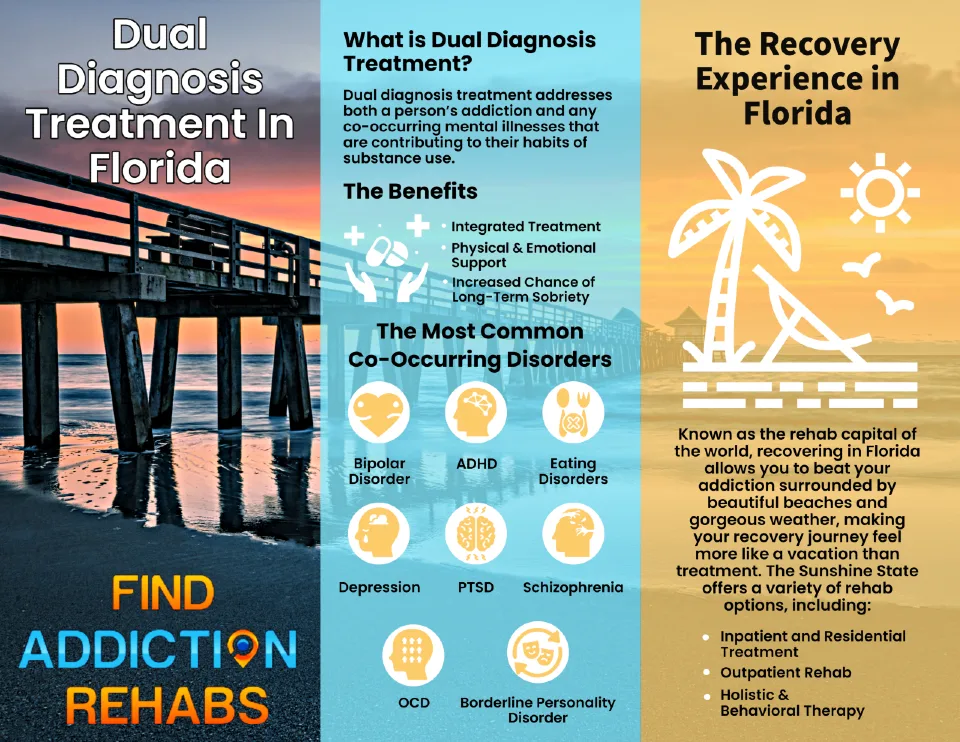What Is A Dual Diagnosis?
Table of Contents
- What Is A Dual Diagnosis?
- What Are Mental Health Disorders?
- How Are Addiction And Mental Health Related?
- How Does A Mental Disorder Develop?
- What Are The Signs Of Mental Health Disorders?
- What Is A Dual Diagnosis Treatment?
- What Does Dual Diagnosis Treatment Look Like?
- Medical Detox Before Dual Diagnosis Treatment
- Inpatient Treatment at a Dual Diagnosis Rehab
- Dual Diagnosis Residential Treatment Centers In Florida
- Does My Health Insurance Cover Dual Diagnosis Treatment?
- Finding A Dual Diagnosis Treatment Center In Florida
- Medically Reviewed By
Before getting into what treatment for a dual diagnosis is, it is important to first understand what dual diagnosis and mental health disorders are. A dual diagnosis within an individual is someone suffering from a mental disorder and a substance abuse problem.
This substance abuse, or in worse cases addiction, can be seen in a substance use disorder (SUD), another type of mental health disorder. A SUD affects the brain and behaviors within an individual and causes them to struggle with inhibiting substance abuse.
The existence of another disorder or disorders alongside a SUD are called co-occurring mental disorders and are what make up dual diagnosis disorders. While individuals can have multiple disorders within them, a dual diagnosis refers to a SUD and another co-occurring disorder.
Keep reading to find out all about these treatable conditions, and get a complete breakdown for finding dual diagnosis treatment centers in Florida!
What Are Mental Health Disorders?

Traditionally, a mental health disorder was referred to as a mental illness however, as time progresses and understanding of mental health develops, the naming of the psychiatric disorders changes from mental illness to mental disorders.
The stigma around mental health and mental illness typically leads people to believe that the cause is due to an individual’s weakness or choice. Mental illness and mental health disorders can arise for many reasons; however, weakness or choice are not factors.
Mental health disorders are disorders that affect thinking, feeling, mood, and behavior within an individual. They are often life-long disorders that an individual must live with and manage throughout their life.
Some of the many disorders include:
- Bipolar disorder
- Post-traumatic stress disorder
- Anxiety disorder
- Major depressive disorder
- Schizophrenia
- Eating disorders
These mental health conditions can affect an individual’s daily functions, processes, and actions which may cause a lowered quality of life or experience. A lack of general understanding of these disorders causes these individuals to struggle in understanding their own experiences.
What’s The Difference Between Dual Diagnosis And Comorbidity?
Similar to the term, co-occurring disorders within SUDs, a dual diagnosis relates specifically to a SUD. A dual diagnosis is the presence of another disorder alongside a SUD. Comorbidity is the presence of two or more disorders within an individual and can also be referred to as a dual diagnosis.
Why Do SUDs And Mental Disorders Happen Together?

Unfortunately, there still is no definitive answer as to both what comes first and what causes mental health issues. An underlying mental health issue can worsen with substance abuse and lead to more apparent symptoms.
The lack of education surrounding mental health does not help this issue either. An undiagnosed individual may be mischaracterized as they struggle with their various needs in unsupportive environments.
How Are Addiction And Mental Health Related?
Individuals struggling with mental health are more likely to become addicted to a substance. Mental conditions make it difficult for an individual to manage their daily experience.
Individuals with mental conditions have to endure the problems that come with daily life as well as their symptoms which can make it immensely difficult to lead a stable and comfortable life. These individuals may lean on substances as a way to deal with their altered experiences.
In substance abuse and addiction, the mind of an individual is altered and as the brain changes, an individual is likely to experience unwanted psychological withdrawals from a substance. Individuals with a SUD are half as likely to have co-occurring disorders as they are to not.
Withdrawals are one of the major causes that make addiction so difficult to manage. Individuals experiencing severe withdrawal symptoms are prone to relapse. Some of the many withdrawals an individual faces in addiction include:
- Anxiety
- Insomnia
- Changing moods
- Depression
- Irritability
- Hallucinations
- Cravings
- Paranoia
How Does A Mental Disorder Develop?

Rarely do mental health issues arise suddenly. They are typically issues that an individual has been experiencing as they go on with their daily lives. There can be many factors that lead to mental health issues developing within an individual including:
- Family history or genetics
- Brain injury
- Alcohol or substance use
- Traumatic life experiences
- A mother’s exposure to harmful toxins or chemicals during pregnancy
Living With Undiagnosed Mental Illness
There are some individuals who live throughout their lives never knowing their mental health issues. Due to the lack of proper education in society surrounding mental health as well as a lack of accessibility to treatment, individuals are left to suffer and manage on their own.
When undiagnosed, an individual can experience increased levels of negative feelings such as shame, embarrassment, loneliness, self-loathing, and nervousness. As an individual takes on their symptoms throughout their daily lives, they find ways to cope with their reality.
While some ways of self-managing symptoms can be non-harmful, individuals can rely on substances as a way of self-medicating. Self-medicating is a form of choosing forms of medicines for oneself rather than consulting with a medical professional or expert.
This form of coping or managing symptoms from mental health issues can lead to drastic experiences including:
- Worsening symptoms
- Substance abuse
- Addiction
- Dependence on harmful substances
If an individual believes they have a co-occurring disorder or believe to have a mental condition, it is important for them to consult a medical professional, such as a psychiatrist, to receive a proper diagnosis and treatment.
What Are The Signs Of Mental Health Disorders?

An individual may be struggling with mental health issues however due to poor education and lack of accessibility to treatment, these issues may be left undiagnosed. An individual will continue to struggle or manage their lives with this issue.
According to BetterHealth, some of the signs of individuals struggling with mental health disorders include:
- Strange thinking
- Disorientation
- Significant changes in behavior
- Restless or agitated
- Destructive actions
- Significant changes in mood
- Pressures in relationships
- School
- Work
- Social
- Difficulties in everyday activities.
These signs do not necessarily mean that there is a definite underlying disorder within an individual. The frequency of these conditions can help determine the likelihood of a mental health condition.
With mild experiences of these signs and only one or two at a time, it is less likely for an individual to have a condition. More severe experiences of these signs and the presence of multiple at a time make it more likely for an individual to have a condition.
Who Can Give Me A Proper Diagnosis?
A mental health diagnosis for mental conditions can lead to an individual’s better understanding of themselves and learning how to properly manage their experience. It can lead an individual to an improved quality of life.
A psychiatrist is a doctor and medical professional that is able to properly evaluate an individual and help bring them clarity. The process for this diagnosis can include multiple tests, evaluations, and interviews to properly provide an individual with a diagnosis and the right type of dual diagnosis treatment options.
Substance abuse can alter a proper evaluation and lead to an altered result. For a proper analysis, it is best to receive a diagnosis after receiving a medical detox. Treatment centers typically have addiction specialists and resources to properly support individuals in this manner.
What Is A Dual Diagnosis Treatment?
A dual diagnosis treatment is a plan that supports individuals through both or all conditions that are within an individual. It can be very difficult for an individual to recover and abstain from substance abuse while they manage unresolved issues within themselves.
Dual diagnosis treatment is a method of treatment that stresses the importance of an individualized treatment plan. Treatment that addresses every need of an individual provides them with the proper help they require.
Properly addressing an individual’s needs and supporting them limits the issues that may arise later and leads to a lasting recovery from substance abuse. One of the core necessities in dual diagnosis treatment programs is determining co-occurring conditions.
Leaving co-occurring disorders undiagnosed, can lead to relapse or other personal issues within an individual that can arise. It is difficult for an individual to remain substance free while managing other co-occurring mental issues.
Understanding and determining these issues within an individual typically occurs after detoxification from substance abuse. One of the many treatment services available at a dual diagnosis treatment center is a mental health professional.
This professional can help with diagnosing an individual with other possible co-occurring disorders and guide an individual through understanding themselves.
What Does Dual Diagnosis Treatment Look Like?
There is no one type of treatment that best fits dual diagnosis treatment. Individualized treatment plans are created to find the best treatment that works for an individual and their needs.
A dual diagnosis treatment, as well as addiction treatment in general, typically start with a medical detox. After this drug detoxification, a dual diagnosis treatment program can incorporate many different forms of treatment which can include:
- Medication therapy
- Behavioral therapy
- Support groups
- Mental health treatment
- Education on substance abuse
- Relapse prevention skills
- Stress management
- Healthy coping skills
- Family therapy
- Group therapy
These forms of treatment can be done in an inpatient or residential treatment or outpatient treatment. There are varying forms of delivery to provide treatment options to an individual and allow them to build a treatment plan.
The differences between substance abuse treatment and dual diagnosis treatment typically occur after drug detoxification. Rehabilitation facilities use specialized treatment methods to help individuals through recovery and maintaining abstinence from substance abuse.
Treatment facilities are equipped with the various resources needed to provide an individual with the proper treatment. Medical professionals can help individuals create a treatment plan that best fits their recovery needs.
Medical Detox Before Dual Diagnosis Treatment
A medical detox is an inpatient treatment program in which an individual stays at a treatment center to receive 24-hour care under medical supervision. This type of care can be very beneficial for individuals struggling with severe withdrawals.
With medical professionals available to support and ease individuals through withdrawals, they are able to avoid difficult and potentially dangerous withdrawal symptoms. Depending on an individual’s state and needs, medications can be used to assist the body and mind of an individual.
These medicines are used for substance abuse in certain substance addictions such as tobacco, opioid, and alcohol addiction. Medications can support individuals through abstinence and cravings, allowing their bodies to function without the substance.
Some medications are also used to help an individual manage the symptoms of a mental condition. With the backlash of substance abuse withdrawal as well as the symptoms of a co-occurring condition, an individual may struggle through an unbearable experience.
Inpatient Treatment at a Dual Diagnosis Rehab
Inpatient care is a form of residential treatment that requires individuals to live onsite at a treatment center. This option can be very beneficial for individuals that wish to be removed from their environment and comfortably limit their drug-seeking behaviors.
Inpatient treatment programs are more often long-term residential forms of treatment that provide 24-hour care for individuals. An inpatient addiction treatment center may offer a medical detox onsite and allow individuals to become integrated into that environment.
This can be a medication-assisted treatment depending on the mental health issues an individual is struggling with or the substance an individual was using.
Outpatient Treatment for Co-Occurring Conditions
Outpatient care is a less intensive form of treatment when compared to inpatient care. Outpatient treatment programs are often focused on therapies such as family therapy, behavioral therapy, and group therapy.
Support groups are a form of group therapy that allows for individuals to be involved with other individuals recovering from drug and alcohol addiction. Although outpatient care is typically less intensive, intensive outpatient programs are available for individuals.
Intensive outpatient treatment programs are considered to be just as intense as inpatient treatment aside from living onsite at a treatment center.
Partial Hospitalization Programs or PHPs
A partial hospitalization program is a hospital-based intensive outpatient treatment in which clients are able to receive medical care through withdrawals and other psychiatric issues including co-occurring disorders.
Medical professionals watch over individuals in this program and can provide medications to assist an individual through their psychiatric issues when it is needed. Partial hospitalization can provide a separate form of a medical detox named ambulatory detoxification.
As a medical detox is a residential form of detoxification, ambulatory detoxification is a more moderate form of detoxification that is able to be undergone for individuals with mild to moderate withdrawal symptoms.
Individuals typically remain at the treatment center during the day and return home at night. As the symptoms start to diminish, an individual gradually needs less time in this type of treatment.
Dual Diagnosis Residential Treatment Centers In Florida

As dual diagnosis treatment focuses on providing treatment for all conditions within an individual, residential treatment centers focus on assisting an individual through all of their symptoms while in care.
Long-term residential treatment often focuses on rehabilitating individuals back into the world socially through the development of social skills and communications among other recovering individuals.
This helps provide a stable support system for individuals as they slowly return to their daily lives. Stability is a core component of maintaining recovery and abstinence from substance abuse.
Does My Health Insurance Cover Dual Diagnosis Treatment?
The cost of treatment can often steer individuals away from receiving much-needed and desired treatment. Health insurance is usually relied upon as a method of paying for an addiction treatment program.
Most insurance plans cover addiction treatment services under the mental health and behavioral health portions of their insurance plans. These are essential parts of insurance plans. The extent to which an individual is covered depends on the type of plan they have.
Not every treatment facility will accept the insurance you have. Find Addiction Rehabs can help you with finding a treatment facility that accepts your insurance based on your individual insurance plan.
Finding A Dual Diagnosis Treatment Center In Florida
As Florida is known as the rehab capital of the world, there are many dual diagnosis treatment programs available in Florida. Here at Find Addiction Rehabs, we can assist you and your loved ones in finding the right treatment.
Whether finding a treatment center in your location or connecting you with recovery tools and resources, our hotline is available 24/7 to make sure you can get the help you need, anytime you need it.
Trying to manage mental health on your own can be immensely difficult, especially alongside substance abuse and addiction. Call us today and we will help find the right dual diagnosis treatment for you!
Brandon is a highly skilled content writer and behavioral health marketer with over a decade of experience. In his own words: in my work with Find Addiction Rehabs, I have dedicated my expertise to a cause close to my heart – substance abuse recovery. Through my passion for the field, I’ve successfully compiled a track record of crafting compelling content that educates, inspires, and supports those on their recovery journeys.


